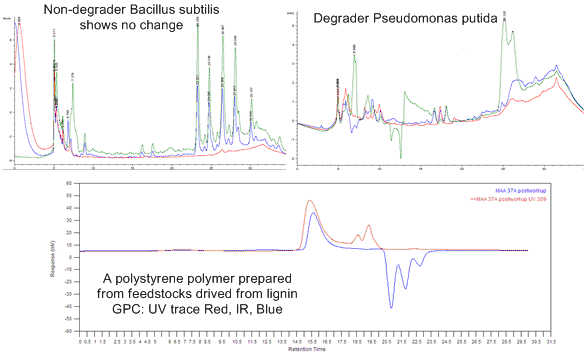Renewable aromatic feedstocks (lignin degradation)
In collaboration with Prof. T. Bugg, Dr. K. Kirwan and Dr. G. Barker we have been developing new biological methods of degrading lignin to aromatic precursor feedstocks. Screening of a range of micro-organisms coupled to HPLC and GC-MS analysis allows for a range of aromatic feedstocks to be identified. It is possible to make a range of polystyrene, polyurethane and polyester products from these feedstocks.

In collaboration with Prof. A. Lapkin we have investigated the extraction of medicinally interesting anti-oxidants from artemesia annua. The main use of the plant is the preparation of artemesinin (an important antimalarial drug). We have used the biorefinery concept to extract a range of other useful chemicals. In particular we have investigated the use of flavanoids as monomers to make novel polymethymethacrylate, polyglcerol, polyester and epoxy resins that retain anti-oxidant properties.

Relevant publications
Extracting valuable compounds from straw degraded by pleurotus ostreatus. C. I. Koncsag, A. J. Clark, D. Easton, S. R. Coles, A. E. Collis, K Kirwan, Resources, Conservation and Recycling, 2012, 58, 14-22.
Production of novel chemicals from lignocellulosic wastes. Costs estimation. C. I. Koncsag, S. R. Coles, A. J. Clark and K. Kirwan, Bioresource Tech. 2012, submitted.
